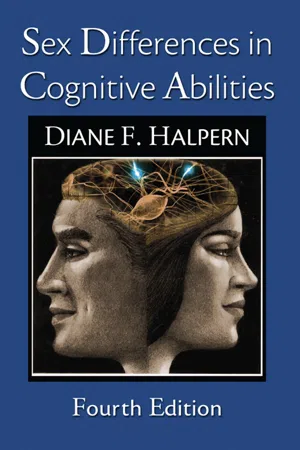Psychology
Genetical Research on Testosterone
Genetical research on testosterone explores the genetic basis of testosterone levels and its impact on behavior and psychological traits. This research aims to understand how genetic variations influence testosterone production and its effects on aggression, dominance, and other behavioral traits. By studying the genetic underpinnings of testosterone, researchers seek to gain insights into the complex interplay between genetics, hormones, and behavior.
Written by Perlego with AI-assistance
Related key terms
1 Key excerpts on "Genetical Research on Testosterone"
- eBook - ePub
Sex Differences in Cognitive Abilities
4th Edition
- Diane F. Halpern(Author)
- 2013(Publication Date)
- Psychology Press(Publisher)
Of course, hormone manipulations are unethical for human subjects. But, in at least one study, researchers were able to persuade Institutional Review Boards (IRBs) that it was safe to administer a single dose of testosterone to women in a double-blind, placebo-controlled, cross-over study (Aleman, Bronk, Kessels, Koppeschaar, & van Honk, 2004). “Double-blind” means that neither the participants nor the researchers who collected the data knew who was in the experimental treatment group or who was in the control group. “Placebo-controlled” means that the control group received a similar treatment as the experimental group except that instead of being injected with testosterone, they were injected with an inert substance that would not affect cognition. Finally, the term “cross-over study” means that some participants first received the testosterone and then the placebo and other participants first received the placebo and then the testosterone. The participants who received testosterone showed significantly better performance on a three-dimensional version of the mental rotation test than those who did not (all the participants were women). These are very powerful results that raise several ethical questions that will be addressed in the final chapter. For example, if women achieve higher visuospatial scores after just one injection of testosterone, then is it ethical to allow women (or men) to inject testosterone prior to taking high stakes examinations such as the SATs or Graduate Record Examinations or perhaps surgeons prior to performing delicate surgery or pilots making a difficult air plane maneuver? Rapid advances in the biological underpinnings of cognition raise many new ethical questions.Theories Relating Sex Hormones to Cognitive Abilities
Four theories (or theoretical approaches) about the relationship between hormone levels and cognition have spurred much of the research in this area. Theories are important because they provide the explanation or answer to questions about why cognitive abilities may be dependent on sex hormones or why some seemingly strange relationships among variables would make sense.Geschwind–Galaburda Theory of Prenatal Hormones Effects
Norman Geschwind was an early pioneer in the study of hormone effects on behavior, a field that is called “behavioral neurology.” An influential theory proposed by Geschwind and his colleagues, most notably Galaburda, is based on the underlying assumption that prenatal hormones have a pervasive effect on cognition (e.g., Geschwind, 1983, 1984; Geschwind & Galaburda, 1987). This theory posits that the prenatal sex hormones that both direct and reflect the sexual differentiation of the fetus also exert powerful influences on the central nervous system of developing organisms. In humans, the right hemisphere (half of the brain) normally develops at a faster rate than the left. Because of this differential rate of development, the left hemisphere is at risk for possible negative effects for a longer period of time than the right, and therefore is more likely to be affected by an adverse intrauterine environment. Proponents of this theory assert that high levels of testosterone slow the growth of neurons in the left hemisphere. The result is right hemisphere dominance, which means that the right hemisphere has greater control than the left hemisphere for many cognitive and motor functions.
Learn about this page
Index pages curate the most relevant extracts from our library of academic textbooks. They’ve been created using an in-house natural language model (NLM), each adding context and meaning to key research topics.
